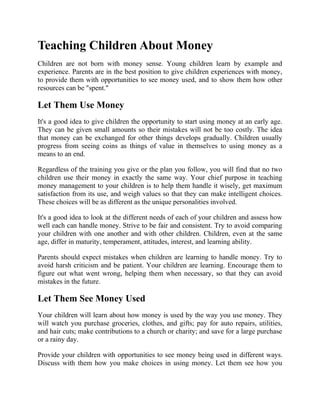
Teaching children about money
- 1. Teaching Children About Money Children are not born with money sense. Young children learn by example and experience. Parents are in the best position to give children experiences with money, to provide them with opportunities to see money used, and to show them how other resources can be "spent." Let Them Use Money It's a good idea to give children the opportunity to start using money at an early age. They can be given small amounts so their mistakes will not be too costly. The idea that money can be exchanged for other things develops gradually. Children usually progress from seeing coins as things of value in themselves to using money as a means to an end. Regardless of the training you give or the plan you follow, you will find that no two children use their money in exactly the same way. Your chief purpose in teaching money management to your children is to help them handle it wisely, get maximum satisfaction from its use, and weigh values so that they can make intelligent choices. These choices will be as different as the unique personalities involved. It's a good idea to look at the different needs of each of your children and assess how well each can handle money. Strive to be fair and consistent. Try to avoid comparing your children with one another and with other children. Children, even at the same age, differ in maturity, temperament, attitudes, interest, and learning ability. Parents should expect mistakes when children are learning to handle money. Try to avoid harsh criticism and be patient. Your children are learning. Encourage them to figure out what went wrong, helping them when necessary, so that they can avoid mistakes in the future. Let Them See Money Used Your children will learn about how money is used by the way you use money. They will watch you purchase groceries, clothes, and gifts; pay for auto repairs, utilities, and hair cuts; make contributions to a church or charity; and save for a large purchase or a rainy day. Provide your children with opportunities to see money being used in different ways. Discuss with them how you make choices in using money. Let them see how you
- 2. compare products and services before you spend your money. Children are very observant. You will be their role model. Show Them Other Resources Children soon discover that the family gets money by exchanging the time and work talents of one or both parents for it, and that the family then exchanges the money for certain goods and services. Children also should learn early in life that there is only a certain amount of money available and that most of this has to be used for such things as food, housing, clothing, taxes, and insurance. It's a good idea to explain to children that these expenses come first and that much of the family income is spent for items that benefit the entire family. Explain that your family is really getting more out of its income when you do some things yourselves and when you take good care of things to make them last longer. Let your children know that when you wash your car, make your own clothes, grow vegetables in your garden, mow your lawn, and do other jobs for and with your family, you are saving money that can be used in other ways. Doing some of these things for the family becomes somewhat routine to most adults, so we forget to let children know why we do them. Try to create an awareness in your children of one of the basic facts about effective use of resources--that when they help with household tasks and when they take care of their toys, clothing, and other things around the house, they are helping the family to save money for other uses.